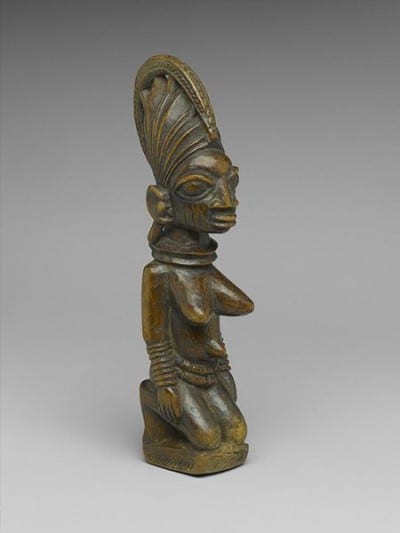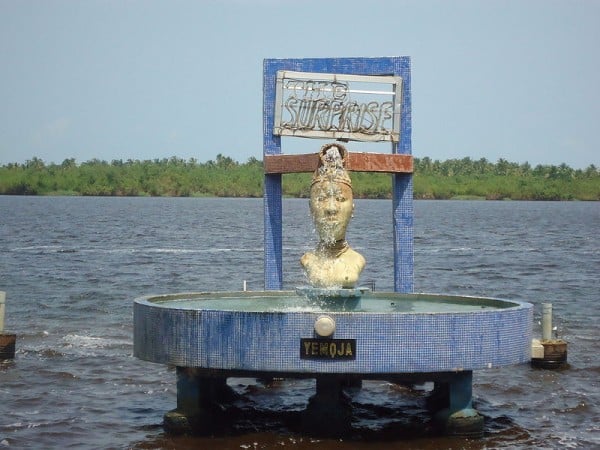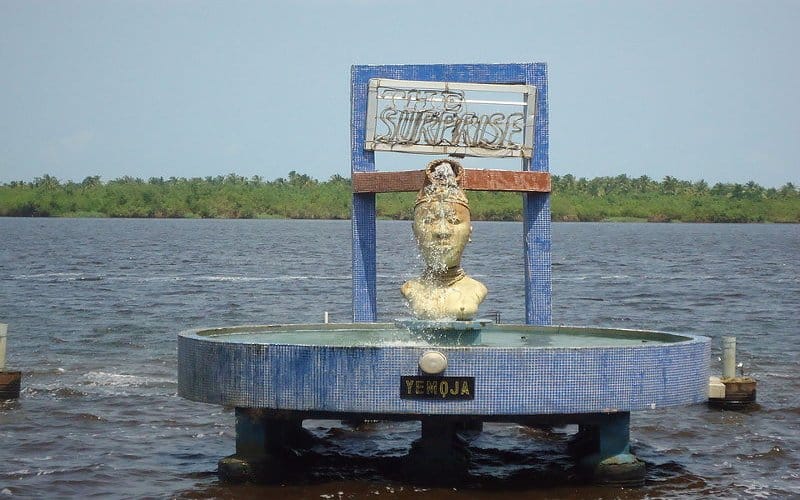In the vibrant embroidery of the Yoruba religion, one deity stands out as a distinguished and sacred figure – Yemoja. Many spiritual denominations celebrate Yemoja, the powerful Goddess of the Sea in Yoruba. She manifests herself as a force of nature: a mother, protector, and nurturer.
She holds immense importance in Yoruba culture, touching on various aspects of life. People know her as the goddess of water. They believe she can bring rain, ensuring bountiful harvests and prosperity for the community. She is also associated with fertility. She grants the blessing of children and safeguards expectant mothers.
Names and Etymology of Yemoja
Pronouncing Yemoja
The name “Yemoja” is typically pronounced as “yeh-Moh-Jah” with the stress on the second syllable.
Yemoja meaning
The Yoruba people derived the word Yemoja from the Yoruba words yeye-omo-eja, which typically means mother-children-fish.
For this reason, she earns the title of the mother of fish children.
Names of Yemoja
- Yemoja (Yoruba)
- Yemaya (caribbean)
- Yemanja (Brazil)
The mythology of Yemoja, The Yoruba sea goddess
According to Yoruba mythology, Yemoja holds a significant position as a sacred deity associated with water. Within the Yoruba religion, people acknowledge her as a divine entity connected to water bodies. They also recognize other orishas, such as Osun, the Yoruba orisha of divinity, femininity, beauty, and love.

People believe she can travel across different bodies of water, including the vast sea. However, people believe that she resides spiritually in the Ogun River, located in Nigeria.
She is also portrayed as a mermaid & is also known as La Siren, or Mami Wata(mother of water). She represents the portion of the Ocean that gives life. Her influence extends far and wide, touching all aspects of life affected by the presence of water.
Powers of Yemoja
Yemoja has numerous powers and abilities within Yoruba mythology. As a water deity of great importance, she holds sway over the domain of waters and its various manifestations.
Control water bodies: One of her renowned abilities is the control she exercises over bodies of water. This includes lakes, rivers, and the wide expanse of the sea. People believe that she possesses the power to calm storms and turbulent waters. They say her presence brings peace to the stormy waves and soothes the raging currents. This aspect of her power is highly sacred as it symbolizes her role as a protector and provider of safety for those who depend on the waters for their livelihood.
Healing: Yemoja is associated with healing properties. In addition to her influence over natural phenomena. People believe she can cleanse and purify physical, emotional, and spiritual afflictions. Devotees seek her assistance in matters of well-being and restoration. They turn to her for healing and restoration.
Fertility: The goddess is sacred for her ability to bestow fertility upon those who seek it. Couples desiring children often turn to her for blessings and assistance in conceiving. People regard her as a maternal figure, nurturing and protective. She safeguards the well-being of both mothers and children.
Abundance: Moreover, people associate the goddess with prosperity and abundance. People believe that she extends her good acts to matters of wealth and success. Devotees seek her favor to attract prosperity, abundance, and the attainment of material and spiritual blessings.
Attributes of Yemoja
Yemoja defines her character through various attributes and qualities.
Resilience: Yemoja has survived various transformations and adaptations. We believe she has undergone various changes and challenges, yet she has emerged stronger.
Empathy: Yemoja’s compassionate nature enables her to deeply understand and empathize with the struggles and emotions of others. She is also often portrayed as a motherly figure and a nurturing deity, she exemplifies empathy by providing comfort, care, and support to those in need. Her motherly love extends to all beings and her empathy helps her to address their emotional and spiritual needs.
Protective: Yemoja, the prominent deity in the Yoruba religion, is widely recognized as a protective figure. The goddess is protective in various ways. Yemoja is a guardian of women and also shields her devotees from harm. She ensures the safety of fishermen, sailors, and travelers who journey across water bodies.
Strength: Yemoja’s strength lies in her dominion over the sea, her life-giving powers, her spiritual and protective abilities, and her role as a cultural and social icon. As a deity who encompasses the physical, spiritual, and cultural realms, Yemoja’s strength continues to inspire devotion among her followers.
Significance of Yemoja

Yemoja holds significant importance within the Yoruba religion, playing a central role in its cosmology and spiritual practices. Here are some key significances of Yemoja to the Yoruba religion:
1. Divine motherhood: Yemoja holds the sacred role of being the divine mother of all beings. She embodies the nurturing and protective qualities associated with motherhood. Her role as a mother figure symbolizes creation, fertility, and the sustaining force of life. Everyone sees her as the source of all existence and the caretaker of humanity.
2. Water and Life: The goddess is closely associated with water, which holds immense symbolism within the Yoruba religion. Water represents life, purification, and transformation. Yemoja’s connection to water signifies her role in bringing forth life, sustaining it, and facilitating spiritual cleansing and renewal.
3. Healing: She is a compassionate and empathetic deity, who provides emotional healing and support to her devotees for their emotional well-being. Through her nurturing presence, she offers solace, comfort, and guidance to those facing emotional challenges or distress. Yemoja is sought after for emotional stability, healing of emotional wounds, and finding inner peace.
4. Divine Shield: Yemoja, a protective deity, offers her divine shield to those who seek her aid. She is often invoked for physical and spiritual protection, safeguarding individuals, families, and communities from harm and negative influences. Her guardianship extends to women, children, and all who call upon her.
5. Fertility: She associates with fertility, encompassing both childbirth and the fertility of the land. Her blessings are sought for the successful conception, safe delivery, and healthy upbringing of children.
6. Harmony: Yemoja promotes harmony and unity among individuals and communities. She actively mediates conflicts, fosters understanding, and establishes peaceful relationships. Yemoja’s presence brings about a sense of community, cooperation, and balance.
Symbolism of Yemoja
Various symbols represent and are also associated with the Yoruba Goddess.
Colors
- White.
- Blue.
Plants
- Lillies.
- Coral.
- White roses.
- Lotuses.
Objects
- Jewelry.
- Sea shells.
- Cowries shells.
Food
- Coconut cake.
- Watermelon.
Worship and offerings of Yemoja
Worship of the goddess first occurred at the Ogun River. Ogun River is a waterway that starts in Oyo state and flows through Ogun state and into Lagos state in Nigeria. There are multiple Worship days of the goddess including February 2nd, June 22nd, September 7th, October 9th, December 26th, and December 31st.

Devotees normally sing, dance, pray, feast, and give offerings in the name of the goddess. Fish is always present throughout the celebration.
Offerings to Yemoja
1. Water: As Yemoja is closely associated with water, offerings of clean, pure water are highly significant. Devotees may pour water into a sacred vessel or directly onto the earth as an offering to honor their connection with the element.
2. Fruits and Sweets: Offerings of fruits are commonly given to the goddess. They are particularly those associated with femininity and abundance. Examples include watermelon, oranges, lemons, and grapes. Sweet treats like honey, molasses, and sugarcane are also offered to invoke her sweetness and nurturing qualities.
3. Sea shells and coral: Yemoja symbolizes her association with the ocean and water by offering sea shells and corals. She considers these natural treasures sacred and can place them on her altar as offerings.
4. White flowers: white flowers, such as lilies, lotuses, and white roses, to Yemoja as symbols of purity, beauty, and femininity. People believe that these flowers please and attract her divine presence.
5. Perfumes: people associate Yemoja with pleasant scents and aromas. Devotees may offer perfumes, essential oils, or incense with sweet and floral fragrances to please her and create a pleasing atmosphere during rituals and ceremonies.
6. Jewelry and Adornments: Yemoja is often depicted wearing jewelry and adornments. As offerings, devotees may present necklaces, bracelets, or anklets made of beads, particularly blue and white beads that represent her colors.
7. Cowrie Shells: In the Yoruba religion, people consider cowrie shells to hold spiritual significance and sacred. They associate wealth, fertility, and divination. People can make offerings of cowrie shells to Yemoja, symbolizing her power and connection to these aspects.
Oriki Yemoja (Praise of Yemoja)
Agbe ni gybe’s ki Yemoja Ibikeji odo.
It is the bird that takes good fortune to the Spirit of the Mother of the Fishes, the Goddess of the Sea.
Aluko ni igbe re k’losa, ibikeji odo.
It is the bird Aluko that takes good fortune to the Spirit of the Lagoon, the Assistant to the Goddess of the Sea.
Ogbo odidere i igbe’re k’oniwo.
It is the parrot who takes good fortune to the Chief of Iwo.
Omo at’Orun gbe ‘gba aje ka’ri w’aiye.
It is children who bring good fortune from Heaven to Earth.
Olugbe-rere ko, Olugbe-rere ko, Olugbe-rere ko,
The Great One who gives good things, the Great One who gives good things, the Great One who gives good things.
Gbe rere ko ni olu-gbe-rere.
Give me Good Things from the Great One who gives Good Things
Ase!
So be it!
Yemoja Across Borders
During the peak era of the slave trade, the captors took our Yoruba ancestors, who were followers of Yemoja and transported them all over the world as slaves.
In various Afro-Caribbean and Afro-Brazilian religious practices, people idolize the goddess under different names and variations, as she transcends borders.
Santeria (Cuba):
In the Afro-Cuban religion Santeria, people know Yemoja as Yemayá. She is one of the most sacred Orishas (deities) in the religion. Orisha Yemayá is associates with motherhood, the ocean, and feminine power. All Orishas consider her the nurturing and protective mother. In Santeria rituals, devotees offer her offerings such as water, fruits, flowers, and candles. During the festival of La Virgen de la Candelaria, Yemayá’s devotees gather near bodies of water to celebrate and honor her on February 2nd.
Candomblé (Brazil):
People in Candomblé know the goddess as Yemanjá or Iemanjá. Her devotees worship her as a prominent deity associated with the sea, fertility, and motherhood. Her devotees ahighly regard Yemanjá as the “Queen of the Waters” and considers her a compassionate and protective figure. Celebrations dedicated to Yemanjá take place on New Year’s Eve and February 2nd. Devotees offer gifts such as flowers, perfume, mirrors, combs, and jewelry. In Brazil, there are grand processions and ceremonies near the ocean to honor her.
The goddess’s presence in these religions demonstrates the enduring influence of Yoruba spirituality. It also shows the adaptability of her worship. African diaspora religions have evolved in different regions.
Final thoughts
Yemoja is the powerful Goddess of the Sea in Yoruba religion. She holds immense importance in Yoruba culture. She associates herself with various aspects of life. These include fertility, abundance, healing, and protection. People in Yoruba culture worship and celebrate Yemoja. Afro-Caribbean and Afro-Brazilian religious practices also do. Her influence and significance transcend borders. They continue to inspire devotion among her followers.
Featured Image Credit: Samuel Tobbytex007, CC BY-SA 4.0, via Wikimedia Commons

